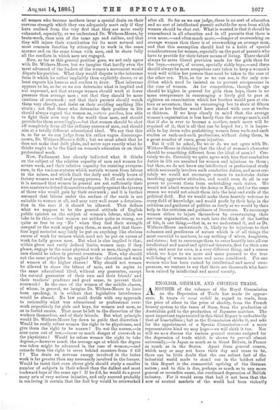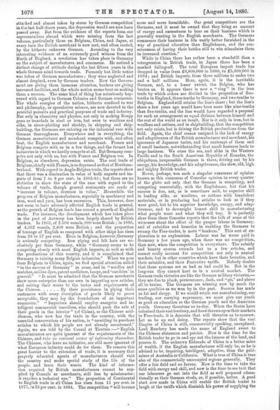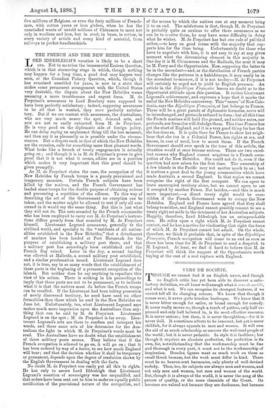ENGLISH, GERMAN, AND CHINESE TRADE.
ANOTHER of the volumes of the Royal Commission on the Depression of Trade has made its appear- ance. It treats de onini scibili in regard to trade, from the price of silver to the price of shoddy, from the French bounty system to the taxes of Siam, from the production of Australian gold to the production of Japanese matches. The most important topic treated in this third Report is undoubtedly that of bimetallism ; but as the Commission shirks it, and asks for the appointment of a Special Commission—of a more representative kind we may hope—we will shirk it too. Nor will we now discuss the various general reasons assigned for the depression of trade which is shown to prevail almost universally,—in Japan as much as in Great Britain, in France as much as in the States. Apart from general causes, which may or may not have their day and cease to be, there can be little doubt that the one salient fact of the industrial world made to stand out in the boldest relief in this Report is the commercial uprising of the German nation ; and to this is due, perhaps as much as to any more general or recondite cause, the continued depression of British industry. For it would seem that had it not been that the new or neutral markets of the world had been violently
attacked and almost taken by storm by German competition in the last half-dozen years, the depression would ere now have passed away. But from the evidence of the reports from our representatives abroad which were missing from the last volume, particularly those on Belgium, China, and Japan, at every turn the British merchant is now met, and often routed, by the hitherto unknown German. According to the very interesting •evidence of an extremely good witness from the North of England, a revolution has taken place in Germany on the subject of manufactures and commerce. He noticed a distinct change of attitude during the last fifteen years in the whole German mind towards trade. Formerly but little notice was taken of German manufactures ; they were neglected and almost despised, even by German traders. Now the Govern- ment are giving them immense attention, bankers are giving increased facilities, and the whole nation seems bent on making them a success. The same kind of thing has notoriously hap- pened with regard to German Colonies and German commerce. The whole energies of the nation, hitherto confined to war and philosophy, or speculative science, are now devoted to the peaceful pursuits and practical purposes of trade and industry. Not only in chemistry and physics, not only in making Krupp guns or ironclads in steel or iron, but even in woollens and silks, in straw-plaiting and shoddy, in shipping and ship- building, the Germans are entering on the industrial race with German thoroughness. Everywhere and in everything, the German manufacturer and merchant compete with, and often beat, the English manufacturer and merchant. France and Belgium compete with us in a few things, and the former has industries in which we hardly compete at all. BO Germany com- petes not only with us, but with France and Belgium too. In Belgium, as elsewhere, depression exists. The coal trade of Belgium, chiefly with France, is as depressed as that of Northum- berland. With regard to Anglo-Belgian trade, the reports show that there was a diminution in value of both exports and im- ports of from 7 to 8 per cent. in 1883-84 ; but there are no statistics to show the state of the case with regard to the volume of trade, though general statements are made of " increase in volume, decrease in value." Meanwhile, the progress of Belgian manufactures, especially in machinery and iron, wool and yarn, has been enormous. This, however, does not seem to have adversely affected English trade in general, as the grc;wth of Belgian trade has caused a growth of English trade. For instance, the development which has taken place in the port of Antwerp has been largely shared by British traders. In 1863, of 2,500 vessels, 900 were British ; in 1883, of 4,362 vessels, 2,408 were British ; and the proportion of tonnage of English as compared with other ships has risen from 38 to 57 per cent. Even in Belgium, however, Germany is seriously competing. Iron piping and felt hats are ex- clusively got from Germany, while "Germany seems to be competing closely with most English imports, as well as with the productions of this country, and it is complained that Germany is ruining many Belgian industries." When we pass from Belgium to China, again, we find special attention called " to the success of Germany " in arms, and in " needles and matches, aniline dyes, patent medicines, lamps, and 'sundries' in general." " It must be admitted that the German merchants show more enterprise than our own in importing new articles, and suiting their wares to the tastes and requirements of the Chinese By their persistence in plying their customers with every description of goods likely to prove acceptable, they may lay the foundations of an important commerce." " Importers should employ energetic and in- telligent commercial travellers, who should push the sale of their goods in the interior " (of China), as the Chinese mid- dleman, who now has the trade in the country, with the essential conservatism of his nation, is "unwilling to purchase articles to which his people are not already accustomed." Again, we are told by the Consul at Tientsin ;—" English manufacturers are quite ignorant of the requirements of the Chinese, and take no rational means of informing themselves. The Chinese, who have no initiative, are still more ignorant of what European industry could do for them. To remove this great barrier to the extension of trade, it is necessary that properly educated agents of manufacturers should visit the country and make special study of the life of the
people, and learn their wants. The kind of informa- tion required by British manufacturers cannot be sup- plied by Consuls or merchants, still less by missionaries ; it requires a technical eye." The proportion of Continental to English trade in all China has risen from 15 per cent. in 1877, to 33 per cent. in 1884. The competition " will become
more and more formidable. Our great competitors are the Germans, and it must be owned that they bring an amount of energy and earnestness to bear on their business which is generally wanting in the English merchants. The Germans commence their business in life vastly better furnished in the way of practical education than Englishmen, and the con- sciousness of having their battles still to win stimulates them to increased exertion."
While in China there has rather been a standstill than a retrogression in British trade, in Japan there has been a marked falling-off. The total European import trade has dropped in value from £6,800,000 in 1880, to £5,400,000 in 1884 ; and British imports, from three millions to under two and a half millions. Here, again, it is the inevitable German, and, to a lesser extent, the Belgian, who has beaten us. It appears there is now a " ring " in the iron trade by which orders are divided in the proportion of five- tenths to England, three-tenths to Germany, and two-tenths to Belgium. England still retains the lion's share ; but the lion's share a few years ago would have been more like nine-tenths than five-tenths, and the lion would have regarded a proposal for such an arrangement as equal division between himself and the rest of the world as an insult. Nor is it only in iron, but in woollens and cottons, and in shipbuilding, that the competition not only exists, but is driving the British productions from the field. Again, the chief reason assigned is the lack of energy and adaptiveness of the British manufacturer and merchant, his ignorance of Japanese tastes, and his contempt of them and • of small business, notwithstanding that small business leads to large business. We cross the sea, and alike in the Western Pacific and in the South American Republic of Ecuador, the ubiquitous, irrepressible German is there, driving out by his energy, his knowledge, and his adaptiveness, the slow, old, high and mighty British trader.
Never, perhaps, was such a singular consensus of opinion known as this consensus of Consular opinion in every quarter of the globe not only that the German is competing, and competing successfully, with the Englishman, but that his success is due, not, as is sometimes said, to superior skill in loading silks, or woollens, or cottons with fraudulent materials, or in producing bad articles to look as if they were good, but to his superior knowledge, energy, and adap- tiveness, and to downright honest skill in manufacturing what people want and what they will buy. It is perfectly clear from these Consular reports that the talk of some of the witnesses about the effect of the pauper labour in Germany, and of subsidies and bounties in enabling the Germans to swamp the Free-trader, is mere " bunkum." This sort of ex- planation is no explanation. Labour was far worse paid in Germany a few years ago, when there was no competition, than now, when the competition is everywhere. The subsidy and bounty system extends but to a few articles, and cannot really account for competition not only in neutral markets, but in other countries which have their bounties, and their subsidies, and their Protective tariffs. Nobody doubts that these systems are as bad as bad could be. But in the long-run they cannot hurt us in a neutral anarket. The German trade victories are like the German military victories,— they are due to pluck, perseverance, dash, and "go," and above all to brains. The Germans are winning now by much the same qualities as we won by in the past. Success has made us fat and sleepy. If we would retain our manufacturing, our trading, our carrying supremacy, we must give our youth as good an education as the German youth and the American youth. Germany threatens us to-day. When the States have colonised their vast territory, and have thrown open their markets to Free-trade, it is America that will threaten us to-morrow. Let us be up and doing. The reports show that the vast Empire of China is still, commercially speaking, unexplored. Lord Rosebery has made the name of England sweet to the Chinese statesman and patriot. Now is the time for the British trader to go in and spy out the fatness of the land, and possess it. The unknown Eldorado of China is a better mine of wealth, if the English manufacturer will-only be, as he is advised to be, inquiring, intelligent, adaptive, than the gold- mines of Australia or California. What is true of China is true also of the commercially unoccupied regions generally. They offer a fair field and no favour. Now is the time to take the field with energy and skill, and now is the time to see to it that our labourers go out into the field as well prepared educa- tionally as their German rivals, or, if possible, better. A good start now made in China will enable the British trader to laugh at the tariffs which diminish his power of supplying the five millions of Belgians, or even the forty millions of French- men, with cotton yarns or iron girders, when he has the unsatisfied wants of untold millions of Chinamen to meet not only in woollens and iron, but in steel, in brass, in cotton, in every variety of article and every kind of material, from railways to pocket-handkerchiefs.




































 Previous page
Previous page